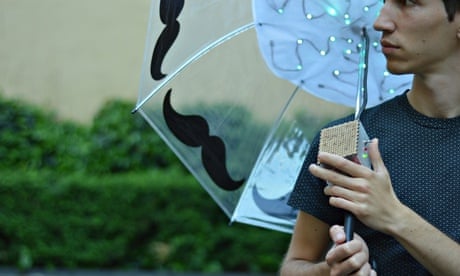The sun is shining, the birds are singing, but no one's really fooled. Lurking by everyone's side is an umbrella, ready to be whipped out and unfurled at a moment's notice.
Capitalising on the ubiquitous accessory, students Simon Herzog, Saurabh Datta and Akarsh Sanghi from the Copenhagen Institute of Interaction Design have upgraded the humble umbrella to create a device that measures air pollution levels via a small box mounted on the shaft.
"We have a pretty sophisticated sensor inside that picks up nitrogen dioxide, carbon monoxide as well as temperature and humidity," says Herzog. "We chose to focus on the pollutants because those were the things that were maybe less apparent to the average person."
Adapted from a simple shop-bought affair and incorporating an Arduino Yún microcontroller board, this is one flashy umbrella. A dynamic LED display, sewn into the umbrella's canopy, provides visual feedback for the user, changing colour and rhythm in response to real-time fluctuations in pollutant levels.
But it isn't only the man on the street that can glean environmental insights from the device. According to Herzog, the "sensing umbrella" can be hooked up to nearby Wi-Fi networks allowing pollutant levels – together with time and location data – to be uploaded to the cloud and used for analysis. With multiple umbrellas swirling around a city, the designers believe the devices could help produce local maps of air pollution. However, while optimistic about the umbrella's potential role in the internet of things, they have taken a rain check on commercialising their brolly. "We are not going to go and start a company right this second," says Herzog. "But I think the concept of people collecting data, of being a node in crowdsourcing data for the greater good, is absolutely valid and this is just one of the many applications."

Comments (…)
Sign in or create your Guardian account to join the discussion